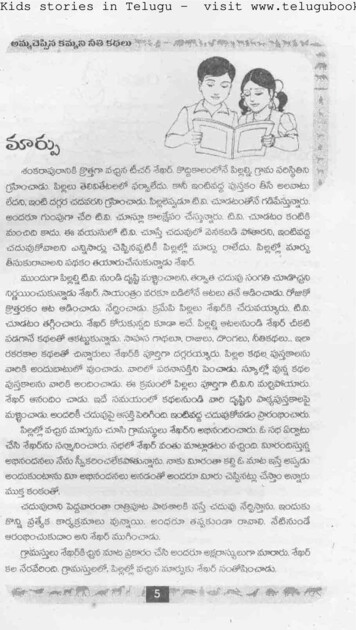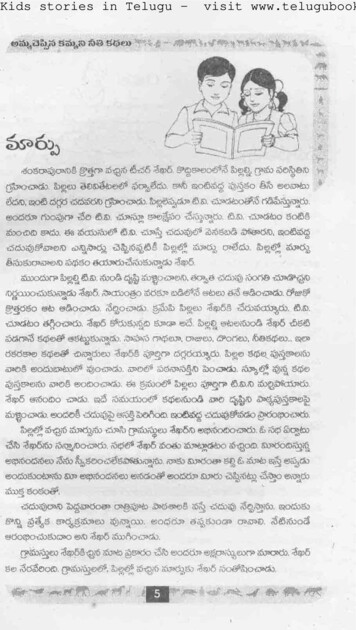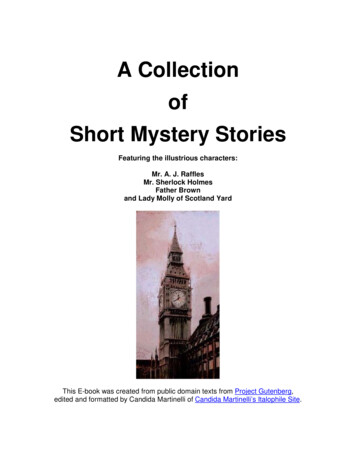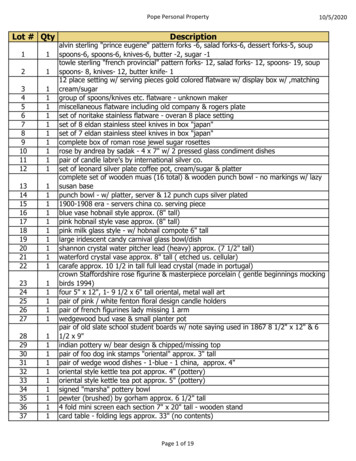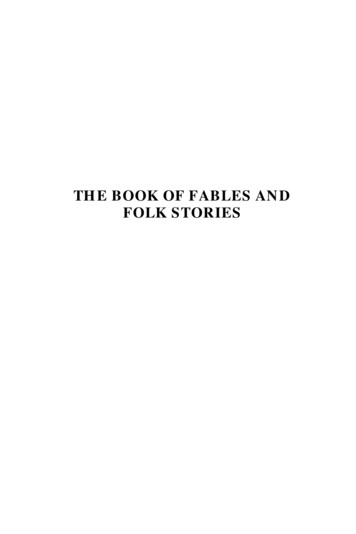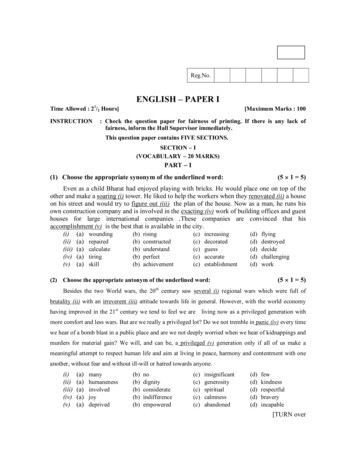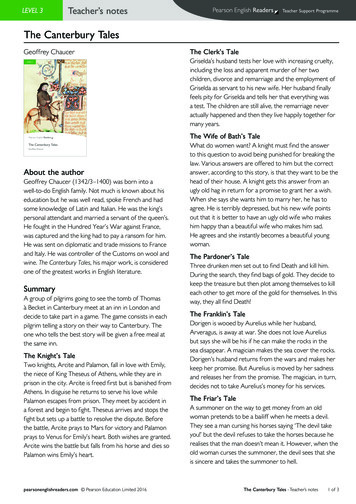
Transcription
TALL TALESSHORTSTORIES20 years of the V.S. Pritchett Short Story Prize
The RSL is grateful to the Authors’ Licensing andCollecting Society (ALCS) for supporting the Tall Tales,Short Stories programme.First published in 2019 bythe Royal Society of Literature.Each story extract its named author.‘Love Silk Food’ from Come Let Us Sing Anyway by LeoneRoss, published by Peepal Tree Press, 2017. Copyright Leone Ross. Reproduced by permission of PeepalTree Press. ‘Synsepalum‘ from Nudibranch by IrenosenOkojie, published by Dialogue Books, 2019. Reproducedwith permission. ‘Hermitage’ from Love and its Seasonsby Aamer Hussein, published by Mulfran Press, 2017.Reproduced with permission. ‘A Better Man’ from thecollection, Tell No-One About This: Collected ShortStories 1975-2017, by Jacob Ross, published by PeepalTree Press, 2017. Reproduced by permission of PeepalTree Press.Stories reproduced as supplied by their authors.Cover illustration Anna Trench, 2019The contributors have asserted their Right underthe Copyright, Designs and Patents Act, 1988,to be identified as authors of this work.ISBN: 978-1-9165033-2-8contentsForewordMolly Rosenberg2‘Love Silk Food’Leone Ross4‘Please Be Good To Me’Emily Ruth Ford6‘The Street of Baths’Fiona Vigo Marshall 8‘The Seduction of a Provincial Accountant’Jonathan Tel10‘Synsepalum’Irenosen Okojie12‘Ray the Rottweiler’Alice Jolly14‘Sahel’Peter Adamson16‘Singing Dumb’Martina Devlin18‘Hermitage’Aamer Hussein20‘The Redemption of Galen Pike’Carys Davies22‘The Premises’Michael Newton24‘The Not-Dead and the Saved’Kate Clanchy26‘A Better Man’Jacob Ross28‘A Dangerous Place’Cynthia Rogerson 30‘The Buck’Gabriela Blandy32‘Master Sunny’Henry Peplow34‘Beef Queen’Cherise Saywell36Notes on Contributors38V.S. Pritchett: A Biographical NoteMaggie Fergusson 42Acknowledgements 44
With the beginnings of these stories, we’re exploring how much ofa world can be created in only 500 words. In inviting you, our 14- to18-year-old readers, to finish the stories with your own 500 words, wewant to see how many different worlds can be made from the samematerial. We want you, the next generation of writers, to take thesestories forward.FOREWORD“Short stories are tiny windows into other worlds and other mindsand other dreams. They are journeys you can make to the far sideof the universe and still be back in time for dinner.”Neil Gaiman frslAs the RSL’s annual V.S. Pritchett Prize for unpublished short storiesturns 20, we celebrate the form’s extraordinary capacity to expressthe complex experiences of our lives in exacting prose.V.S. Pritchett – remembered as one of Britain’s most skilled shortstory writers – wrote that “All writers – all people – have their storesof private and family legends which lie like a collection of halfforgotten toys on the floor of memory.” It is within the power of writinga short story to share these stories with one another, to find our ownvoices and make them heard. In times when we are connected acrossthe world through new digital platforms, but isolated through politicaland social division, can you work with what a writer has started tomake a hybrid tale? The writers in this collection have started thestory – can you finish it?Molly RosenbergDirectorRoyal Society of LiteratureIn this collection, we share the beginnings of stories that have wonthe Prize, and of stories by writers who have judged it. Their rangedemonstrates the agile power of the short story, a form that can takeus between continents and through time, from the unknowable-nessof a stranger to the intimacy of our own private thoughts, and all in afraction of the space and time a novel or play can. Read a collectionof short stories and you watch the world through many eyes; feelthe pressures of different peoples’ worries; experience the joys oftheir successes, the surprise of their discoveries. The short storyfragments included here take us from North London to Barcelona,Delhi to the fictional Piper City. We find ourselves in the emergencyward of a hospital, watching a deer from the window of a cottage,and in a prison cell. Some of our writers create whole stories fromthe conversation between two characters, and others never take youbeyond the stream of their narrator’s consciousness.23
Love Silk Foodthe mall floor, like he’s taking it for a walk.Leone Ross, 2018 and 2019 judgeMrs Neecy Brown’s husband is falling in love. She can tell, because thelove is stuck to the walls of house, making the wallpaper sticky, andit has seeped into the calendar in her kitchen, so bad she can’t seewhat the date is, and the love keeps ruining the food – whatever shedoes or however hard she concentrates, everything turns to mush. Thedumplings lack squelch and bite – they come out doughy and stupid,like grey belches, in her carefully salted water. Her famed liver andgreen banana is mush too; everything has become too-soft and fallingapart, like food made for babies. Silk food, her mother used to call it.She trudges through Saturday crowds that are smelly and noisy. Theyoung people have fat bottom lips and won’t pick up their feet; shehas a moment of pride, thinking of her girls. Normal teenagers they’dbeen, with their moods, but one word from her or one face-twist fromMr Brown, and there was a stop to that! She had all six daughtersbetween 1961 and 1970: a cube, a seven-sided polygon, a rectanglethat came out just bigger than the size of her fist and the twintriangles, oh! The two of them so prickly that she locked up shop onMr Brown for nearly seven months. He was so careful when he finallygot back in that their last daughter was a perfectly satisfactory andsmooth-sided sphere.Mrs Neecy Brown’s husband is falling in love. Not with her, no.She gets away from the love by visiting Wood Green Shopping City ona Saturday afternoon. She sits in the foyer on a bench for nearly twohours, between Evans and Shoe Mart. She doesn’t like the shoes there;the heels make too much noise, and why are the clothes that Evansmakes for heavy ladies always sleeveless? No decorum, she thinks, allthat flesh out-of-doors. She likes that word: decorum. It sounds like alady’s word, which suits her just fine.There are three days left to Christmas and the ceiling of the shoppingmall is a forest of cheap gold tinsel and dusty red cartridge paper.People walk past in fake fur hoods and boots. A woman stands by theescalator, her hand slipped into the front of her coat; she seems calmbut also she looks like she’s holding her heart, below the fat tartanprint scarf around her neck. Then Mrs Neecy Brown sees that thewoman by the escalator is her, standing outside her own skin, lookingat herself, something her Jamaican granny taught her to do when theworld don’t feel right. People are staring, so she slips back inside herbody and heads home, past a man dragging a flat-faced mop across4All grown now, scattered across North London, descending on thehouse every Sunday and also other days in the week, looking forbabysitting; pardner-throwing; domino games; approval; advice aboutunderwear and aerated water; argument; looking for Mamma’s rubbelly hand during that time of the month; to curse men and girlfriends;to leave pets even though she’d never liked animals in the house;to talk in striated, incorrect patois and to hug-up with their daddy.Then Melba, the sphere, who had grown even rounder in adulthood,came to live upstairs with her baby’s father and their two children.The three-year-old sucked the sofa so much he swallowed the pinkoff the right-hand cushions. The eight-month-old had inherited hisfather’s mosquito face, long limbs and delicate stomach, which meanteveryone had to wade through baby sick 5
Please Be Good To MeIndignation failed to mask the speaker’s anxiety.Emily Ford, 2018 winnerSami Lieberman was walking up the escalator at London Bridgestation, looking at her phone, elbowing past passengers standing onthe right, her tights itching from the unexpected hot weather. It wasFriday evening, and the stress of the day was beginning to recede. Shewas thinking about the 141 she would maybe just catch, how she’dgo to Hackney lido if the rain held off. She was thinking back to lastweekend, when she’d gone down to Sussex to see her mother, whoappeared to have aged startlingly in a short span of time; she waswondering whether they were out of dried cat food.Each day she marvelled at the new station. London Bridge gaped shinyand silver as the inside of a spaceship. Workers in hi-vis jackets couldbe spotted putting the finishing touches to beams and concourses.The gleaming caverns seemed too pristine to sully with passengers,quite unlike the dusty train halls of Sami’s childhood. Everything wasdifferent, but in a way that would be reassuring to the average Britishvisitor, with its standard-issue shops: Pret A Manger, Accessorize,Paperchase. Sometimes she was thrown by a closed staircase orshuttered exit, and found herself cast out onto surprising streets.The escalator tipped Sami off onto a dark, covered walkway that ledto the buses. A blockage had interrupted the rush-hour flow of people,and in her peripheral vision she saw a group standing with suitcases,and a small, hunched figure on the outside. Engrossed in her phone,she picked up a snatch of conversation: ‘I’m not sure, we’re just visiting,have you asked the station staff?’A voice replying, frayed with old age. ‘Yes, I have, I have asked. Iasked two gentlemen back there and they told me to go left and leftagain, and now I’m here, and I don’t know where I’m supposed to go.’6Sami looked up. An elderly woman stood talking to four tourists,who smiled at her apologetically. A discussion had been had. The oldwoman was lost and had asked for directions. The tourists did notknow where to send her.Sami considered whether to intervene. The 141 was about to leave,and she hated to miss it, even though she had nowhere in particular tobe. Since moving to London, rushing had become a permanent state.Sami thought for a second and carried on past, towards the buses.Then she glanced back, to where the tourists were shuffling their feet,as if to say they had done all they could. The old woman looked aroundhelplessly. She had short tufts of white hair and bottle-top glassesthat made her eyes look buggy. She was very old, in her late eighties atleast. Maybe ninety. She carried a black holdall and wore a shapelessrain-jacket dotted with pockets, unsuited to the radiant weather. Shehad on baggy grey trousers and comfortable, old-lady shoes.Sami sighed and walked towards her. It would only take a few seconds.‘Where do you need to get to?’ she asked, trying to sound nonthreatening. The tourists dispersed. The old woman’s expressionrearranged itself into not quite a smile, hostility almost, at findingherself such easy prey for a stranger’s pity. Her cheeks, nose, chin andforehead looked as though they might once have formed a coherentwhole, but time had eroded their togetherness and now they hungloose, each feature drifting in its own direction.‘I’m going to Gatwick,’ she said. Skin bagged in soft creases at herneck when she spoke. ‘Gatwick Airport. You see, I asked the man in thestation which way I should go, and he said go out and left, and left andthen right, and I’ve done that, and now I’m all the way over here, and Idon’t know where I need to go.’ 7
The Street of BathsFiona Vigo Marshall, 2016 winnerNUMBER 5, The Street of Baths, is the abode of a refugee who neverleft home. Tucked away in the heart of the Gothic quarter, it’s oneof those vast old tenement blocks into which all Barcelona seemssmelted: green blinds over balconies, plangent Catalan voices,canaries singing, the smell of wine-soaked wood, prawns and pimentofrying. Stairwell haunted by the slap-slap of espadrilles as Jaumein his cream linen suit beats his way up and up, with the steadypersistence of a man going home, who cannot deviate. The fact that heis dead makes no difference. Our typical family member is an insistentapartment-dweller; bounded by a balcony view, at home in two orthree shuttered rooms. Whose garden is a few red geraniums on ared terrace, whose forest is the pine tree, that grows out of black soilgrains mixed with sand, cigarette butts and bottle tops. To this he willalways return.I, also, am a revenant. The place I revisit can never change. I speak notof Barcelona but of some city that is her shadow, her doppelganger,her central avenue made up of walls of flowers and caged birdssinging, her sombre, strolling widows, her gun-smoke and cruelty. Justoff this central artery, the Gothic quarter is a perfect psychogeographyof escape, the sinuous little streets slipping away into an anonymouswarren, the big, blind old entries and stairwells offering refuge.Our footsteps continue up, past landings of closed silence, past thepension on the third floor with its brown leather armchairs like squatmeninas, shoulders framed by coarse lace. And up to the atico, to thenicotined sun through the skylight, and the little, peeling green doorthat might give onto the broom cupboard or the rooftop. In fact it isthe small door of the unlikely, that opens only at the precise momentof need. Flung wide, it casts the oblong blackness of war, whose longshade you cannot see until you are inside. Who but a refugee wouldcover his walls with brown hessian, as if escaping to the strangeland of the fashionable? Go in, down the two steps, and there is theportrait of Jaume himself on the left wall, navy overalls and mockingmoustache, his ironic, blue eyes following you round the living room.It’s an uncanny likeness, sitting on his stool there: truly what they calla speaking portrait. In the dusty silence, with its faint hum of camphorand sun-dried tomato, it speaks to me, anyway.‘Eh, me-edemoiselle,’ in exactly the old Jaume style, speaking Frenchin his Marseillaise drawl, as if spitting tobacco between clenchedteeth. ‘Long time no see. What’s been keeping you?’So lifelike, I could almost swear it’s possible to lean into the portraitand brush cheeks with Jaume; surely he exudes eau de cologne andtobacco, the old smells of home I slip in from the street, as I have always done, less reluctantly thanin years gone by, when visiting my uncle was a duty imposed bymy mother, who would not come herself; but still with trepidation.Tiptoeing past the empty pigeon-holes and janitor’s desk, I can hearJaume ahead of me, somewhere up the five floors of marble stairs;there is no lift. His espadrilles sound weary.89
The Seduction of a Provincial AccountantJonathan Tel, 2015 winnerYou could almost think you were in a foreign country. Once this was atreaty port, and there remain a number of European buildings, prettyand absurd. A pleasure steamer goes past, so close you feel youcould reach out and touch it, with tourists raising phones to capturethe beach. Farther out is a chemical transporter, bizarrely unshiplikein form, being composed of reservoirs and tentacle-like pipes; NOSMOKING is painted in characters larger than the name of the shipitself, and a lone seaman is on deck, leaning against a railing, smoking.The man observing all this turns and climbs over the rocky foreshore,and encounters, coming the other way, a younger man wearing aT-shirt with English words on it. It seems one or the other will have tostep aside, but actually neither does, for there is a vendor drawing theirattention. He is cross-legged on a sheet of white vinyl; his DVD emitsjaunty music while a paper cut-out of a cartoon dog, upright on theplastic, jigs in tempo. How does this work? What hidden mechanismmakes it possible? ‘Buy one for your children! Five yuan each, three forten yuan!’ and, imploring the older man, ‘Buy one for your mistress!’explains, ‘It is a con. The animals won’t dance when you take themhome.’‘They won’t?’‘Look carefully. There is a fishing line sewn through the cut-out ondisplay. He jiggles it with his thumb. The dog doesn’t dance justbecause the music plays. How could it? Do you believe in magic?'The younger man takes off his glasses, and wipes them on his T-shirt.‘Why didn’t you tell me before I bought them?’The older man smiles. He presents a business card; the addressis a prestigious district of Beijing. The younger man is not carryinghis cards; no matter. He is an accountant employed by a third-tierprovincial city. They shake hands, each taking a formal pleasurein saying the other’s name. Qin writes Liu’s information into hissmartphone. He has an intuition in these matters: as soon he spiedthe accountant he knew what kind of person he must be.‘The weather is beautiful,’ Qin says.‘It is indeed beautiful.’It is the younger man who crouches, and gets six, all different, the dogin addition to other creatures. ‘My girls will love this!’‘What’s the weather like, where you come from?’‘The summer is hot. My twins love coming here. The Qingdao breeze isso refreshing.’‘Girls?’ says the older man.‘Twins. In August they'll turn five.’‘Ah, twin girls! How cute! Nature helps you evade the one-child policy.’He adds, ‘I have a daughter too, but she would not like this.’The conversation is cliché’d and stilted, as it should be. This is howone approaches a person like Liu. Qin has perhaps never beforeencountered such a perfect example of the type While the vendor is calling out to some other tourist, the older man1011
SynsepalumIrenosen Okojie, 2018 judgeManu was first spotted in the display window of the old sewingmachine museum touching holes of light on a Babushka costume.He seemed to have appeared from nowhere, a pied piper staginggowns as soft instruments, framed by gauzy street lights. His fingerswere curled into swathes of the costume’s bulbous ruby red taffetaskirt on a mannequin, surrounded by elaborately designed sewingmachines poised like an incongruous metal army. A spool of goldthread uncurled behind him, drinking from the night. A wind chimeabove the blue front door argued with the soft falling of snow. Theletter box slot had a black glove with silver studs slipped into theslash like a misguided disruption. Manu gripped a large curved needlebetween his lips, wiped his brow with a spotted handkerchief. The ashin his pockets felt weightless. He inserted the needle into the skirt’shem, unpicking a shrunken, smoggy skyline. He gathered two moremannequins standing to the side, naked, arms stretched towards theskylight in a celestial pose. Their eyes stared ahead blankly as thoughfixed on a mirage in the distance which could be broken apart thenfed into their artificial skin, into cloth. He placed them in the displaywindow, naked calling cards waiting to be dressed. The spool of threadcut diagonally across rows of sewing machines moored on metalstands, rectangular golden plaques identifying each one. There wasan antique Singer 66-1 Red Eye Treadle from the 1920s, a RussianHandcrank portable number from the 50s, a 1940s MontgomeryWard Streamliner US model, a compact 1930s Jones model fromBucharest with a silver flower pattern crawling up the sides of itssleek, black frame. Manu gathered the thread slowly, a ritual heperformed between each creation. A splintered pain exploded in hischest. In his mind’s eye, the ash from his pockets assembled intofeminine silhouettes. He needed to make more dresses, more corsets,more fitted suits, more gowns. He needed to find more ways to make12women feel beautiful through his creations. The designs rose fromdark, undulating slipstreams as if in resurrection. They were wateryconstructions, insistent, whispering what materials they needed,leaning against his brown irises until they leaked from his eyes ontothe page while his fingers sketched feverishly. He walked to the atelierat the back, a hub flourishing under the gaze of light. There was a long,wooden work table, more sewing machines dotted around it. A coiledmeasuring tape sat in the middle as if ready to entrap a rhinestonecovered, meteorite shaped white gown that would crash through.Materials spilled from the edges towards the centre; rolls of bright silk,piles of linen, open boxes of lace, streams of velvet. There were jars ofaccessories, decorations winking in the glass; zips, studs, feathers,small jewelled delights waiting to adorn the pleat of a skirt, the breastof a jacket, dimpled, soft satin. A black leather suitcase leaningagainst one wall spilled tiny grains of invisible sand from its gut. Theair’s pressure contorted a candy hued ballerina style dress carelesslyflung over a guillotine. It was on this night while leafleting, Noma wasdrawn to the seductive glow from the museum, orbs of light mutatingin the front entrance’s bubble of glass, a coloured small window in adoor, a geometric code for the eye 13
Ray the RottweilerAlice Jolly, 2014 winnerThey tell stories about him in the pub. Used to work in the cider factory.No, the morgue in Hereford. Son of a millionaire-film-star-celebritywith an Aston Martin and all. Family keep him out the way down here.Well, you would do, wouldn’t you?The stories go around with the pints of Westons and the salt andvinegar crisps. Grows a ton of wacky baccy out the back somewhere.Used to be married, but his wife was eaten. Yeah, eaten. Well, you’veseen the teeth on them, haven’t you? Buried her in the garden. Everactually seen him? Nah. Only once at night, digging. Great big hole inthe garden. Body-shaped. Yeah.No one sees him, everyone agrees on that. And certainly no one goesto see him. Except me. Now. Walking down the track towards hiscrooked, bulging house, the sound of barking already loud and thespring-nearly-summer air stained with the smell of dog shit. Josh inthe pushchair and me with some biscuits – rather burnt at the edges –which Josh and I made earlier this morning.Just to be clear – I’m not the home-made-biscuit type, or the sociablecalls-on-neighbours type. But in this world where we now live – twomiles to the village, ten to the nearest town – Ray The Rottweiler, threefields away and down a track, is our only neighbour. So I felt I ought totry. But now that I’m getting closer I’m beginning to wonder.Josh is sitting up straight in the pushchair now, his hand stretchedforward. I approach the high gate. The garden is bare earth, litteredwith dried dog turds. Rottweilers pace up and down by the fence.Hello, I call. Hell-o-o-o.The Rottweilers rush against the gate. My voice is drowned out byanother burst of barking, whining, scratching. Best to go home now,I tell myself. And anyway I can’t stand the smell of dog hair, dog shit,dog pee, dog breath, dog meat. But then a face appears, at an upstairswindow. The face of child, surely, rather than an adult? A voice shouts.Ge-e-e-et out of there, get down. Off. Shift, you fucking mutt. I wait fora moment, wishing again that I hadn’t come.A battle seems to be taking place behind the front door. Slobberingmuzzles appear, a hand gripping a rolled up newspaper, then the backof a man, narrow and frail, in a dirty white T-shirt. He fights his way outbackwards through the crack in the door, batting at the snarling dogswith the newspaper.But even as he does that, the garden dogs are on him, leaping andlicking, their heavy tails slapping against him. Down. Out of it. Goon now, you buggers. He whacks at them with the newspaper as hestarts down the path towards me. He’s tiny, barely five foot four, withthe body of a teenager. His face is red and worn, with wobbly lips,prominent teeth, watering eyes.It’s all dog. Dog everywhere. Slobbering dog faces at every window.Paws sticking out through a chewed gap at the bottom of the ruinedfront door. A dog’s howling head is even poking out of the chimney. OK.Well, maybe not – but you get the picture.At the gate, he smiles and says something. But the dog noise is socontinuous that I can’t hear. He waves his hand, indicates that I shouldwait. Then he moves away to a shed closer to the house. Soon hereappears with large bones and chucks these far down the bare-mudgarden. The dogs go after them and the level of noise drops. He smilescrookedly, nods and comes back to the gate 1415
SahelPeter Adamson, 2013 winnerThe day that Kadré has waited for through the long months of the dryseason had broken without the usual blinding light. He sits up, andwithin a second his heart has begun to pound with the weight of allthat the day might bring.He rolls his head to loosen a crick in his neck. Just outside the doora chicken scratches. The sound of pouring water. And somethingelse. The months of morning dryness have gone from his throat. Heswallows, pleasurably.“When will you go?”His mother has placed a bowl of tamarind water by his mat in silentacknowledgement of anxiety. She is moving around in the shadows ofthe hut, setting things straight, squaring up his school books, pullingthe rush door to one side, letting in the day. The light is opaque, muted,as if seen through a block of salt. He tastes the moisture in the air,pulls the damp into his lungs.“Straight away.”When he has washed he scrapes out the last of the porridge, pushingin sauce with a shard. She hands him his shirt, eyes brimming withconcern.thatch, patterning the jars outside each door. Later, after the mealhad been eaten and the youngest children put to bed, a silence hadsettled on Samitaba as the adults and elders had returned one by oneto squat in their doorways, hypnotised by the rhythm of the rain, awedby the completion of the earth’s slow stain.But this morning the talk is not of the night’s rains, or of the seedsbeing sieved from the ashes, or of how many fingers of grain are left onthe warm floors of the granaries. This morning the whispers are only ofKadré and his journey to the office of the Préfet. Assita watches her son go, passing between fresh ochre walls andthe still dripping thatch. From today, all of their clothes will need morewashing. With a heave she lodges the day’s grain on her hip and setsoff towards the touré, still watching her son as he makes his way tothe road under the eyes of the village. The roofs have been washed,and today the jars will be manoeuvred over the muddy depressionswhere last night the loose waters splattered heavily onto the earth. Allaround the familiar sounds of the morning drift across the compound.Firewood being dragged. Water splashing into pots. Utensils beingscoured with ash and straw. But all eyes are still on Kadré as hepasses the last of the huts and turns towards the road. A few of thewomen, going about their chores, smile their encouragement. A few ofhis own age, lacking tact, call out.Usually, on such a morning, there would be only one topic. For a weekthe skies above Yatenga had been heavy with promise. And yesterday,towards evening, the first warm drops had spilt over onto the dust ofthe compound. Soon the whole village had been crouched in doorways,whooping relief from hut to hut in the dusk as the rain, hesitant atfirst, had begun to insist. “Yel-ka-ye” they had shouted – “no problem”– eyes drinking in the dark blots exploding in the dust, darkening theAssita crosses the broad circle of chaff and peanut shells, alreadyseeing in her mind her son arriving at the edges of the town, crossingthe bridge, passing down the muddy main street to the square,climbing the steps to the veranda of the administration building,standing before the list on the notice board, looking to see if his nameis one of the ten. She transfers the broad bowl of grain to the other hip.Ten names only. The ten chosen from hundreds, perhaps thousands,from all the schools of Yatenga. The ten who will be leaving 1617
Singing DumbMartina Devlin, 2012 winnerMrs Nash is in a hurry coming through our door. “The guards are ontheir way!” She drops onto a chair, fanning herself with her hands. “It’sthe pair from Doon barracks. They were in Con Sullivan’s shop askingfor your house. I slipped out the back, ahead of them.”Mama looks upset. She puts Baby Bridie in the pram, and takes offher apron. Brakes squeal outside. I peek through the window: twomen in navy uniforms, caps down low on their heads, lean their bikesagainst the hedge.They have come to take me away. I’ve been expecting them. But I runtoward the kitchen table and hide under it.Mama bends down between the table legs. “Kitty, come out of thereat once. Wash your face and hands in the basin of water in my room.Quick as lightning, now.”I do as I’m told, but I stay upstairs. Ned is sent to fetch me.“Mama wants to know what’s keeping you. We’re all to go outside andplay, except you. The guards want to talk to you. You’re in trouble.”I long to crawl under Mama and Dada’s big bed, in among the spiders.They scare me – but not as much as what’s downstairs. But I knowthere’s no use, the guards will only reach in with their long arms andpull me out. Maybe I could sneak out through the window and climbdown the drainpipe. Then I could hide in the shed till the guards leave.Only the guards and Mama are in the kitchen when we go down. MrsNash is gone. Even Baby Bridie is gone. My big sister Josie must havetaken her out. Me and Josie share a bed – her feet are always freezing.“Off you go now, Ned,” says Mama. Ned wants to stay and watch.The guards are standing by the door, wearing clips on their trousers.One has silver Vs on his sleeve. He winks at me but I look away. I knowthey have come to put me in jail. I wonder where their handcuffs are.Mama is by the dresser. I go to her, wanting her to hold my hand, butshe’s twisting hers together. I’m hoping she can make everything right.But when I look at her face, I see she can’t.“Isn’t she the grand girl, Mrs Tobin,” says the guard with the silverVs. He has a silver chain, too, above his belt buckle – it goes rounda button and into a lumpy pocket on the front of his jacket. He rubsthe chain, and I see the top of his big finger is missing. It has no nail.Probably, the handcuffs are on the end of that chain. “What age wouldshe be, seven?”“Only barely, Sergeant O’Mahony,” says Mama. “She’s just a little girl.She had her seventh
"short stories are tiny windows into other worlds and other minds and other dreams. they are journeys you can make to the far side of the universe and still be back in time for dinner." neil Gaiman frsl As the RSL's annual V.S. Pritchett Prize for unpublished short stories turns 20, we celebrate the form's extraordinary capacity to express
